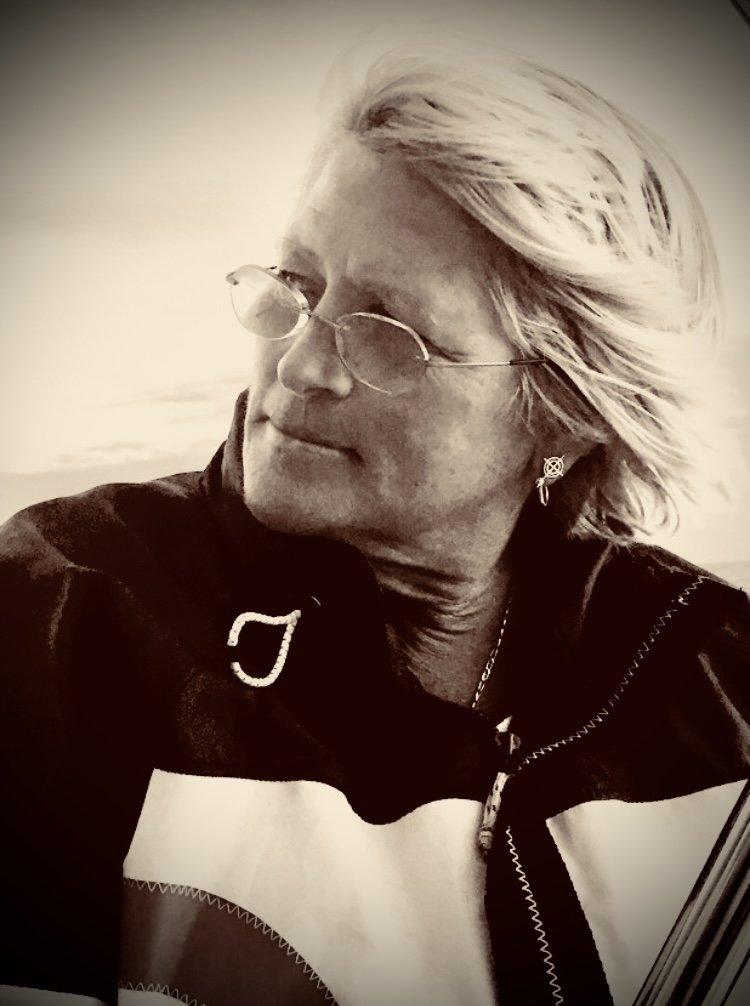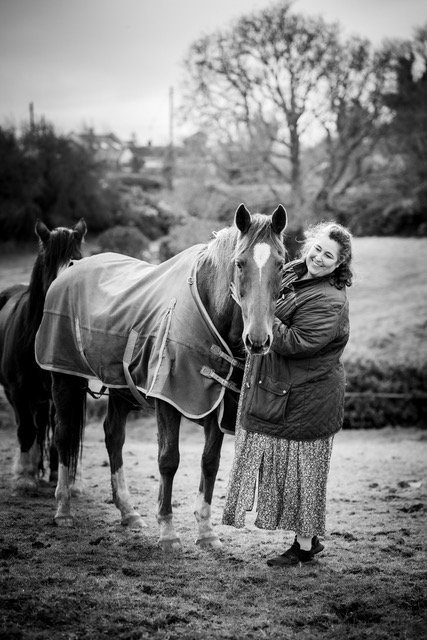R-E-S-P-E-C-T
By Cidnie Carroll
“Find out what it
means to me
R-E-S-P-E-C-T
Take care, TCB”
Left: Vanessa Linsley, captain, broker, boatwright, and veteran racer.
Photo credit: Sir Robin Knox Johnson
The good news is that there are more women sailors than ever before. Sailing instructors report more women seeking sailing instruction. Women are buying more boats than in previous generations. Women-only teams are mounting serious competitive racing campaigns, and mixed gender teams are growing in number. That’s reason to celebrate, right?
Don’t pop that celebratory champagne just yet. While women sailors are growing in number, we still face hurdles that men in the sailing community have privilege to not consider. A survey by the World Sailing Trust found that in countries with over 100 respondents, 85% of women sailors have experienced gender-based discrimination. Discrimination still exists within in the sport, and we still have a long way to go.
The sailing community as a whole has one very important detail in common: no matter the sailor’s gender, ethnicity, age, physical limitations, or sexual preference, we all love sailing. We all share the common bond of loving wind, water, and waves. If we truly love something, we want it to be healthy — to flourish and to grow. For this to happen, we need a shift in the sailing community away from discrimination and bias and a concerted, intentional move towards embracing diversity within the sport. We need each and every sailor, yacht club, and marina to examine and challenge their own biases and make a commitment to do better in the future. In order to do this, we have to be willing to hear the stories and acknowledge the biases women have faced within the sport.
Vanessa Linsley began racing dinghies at the age of seven on Galveston Bay, Texas. By the time she was a college student, she had helped institute a nationally ranked collegiate sailing team at Texas A&M, began her ocean racing career, done professional deliveries, and even worked as a repo sailor. She went on to crew on competitive teams on such famed races as Fastnet and the Whitbread to name but two. These days she sails and lives aboard SV Drifter out of Key West while working as a charter captain, broker, and boatwright. Her love of the sport of sailing has been lifelong and steadfast, despite the frustrating gender, age, and sexual orientation discrimination she has endured.
Vanessa Linsley. Photo credit: Kai Harth
One of the most egregious and memorable instances occurred in the 1990’s at the Royal Ocean Racing Club at Cowes. As a member of an all women team, Vanessa looked forward to celebrating the transatlantic leg with her fellow teammates and competitors. The club let the women’s team know that despite competing in trousers, they would have to wear dresses in order to attend. Vanessa, who has never in her life worn a dress, acquiesced to wear a skirt and blazer. The club then tried to insist that the women wear pantyhose. Vanessa steadfastly refused that point but showed up to the club at Cowes in good spirits. As she approached the door, the doorman refused to open it for her and explained that, as a woman, she would have to use the service entrance. The Royal Ocean Racing Club was for men only. Never mind that their all-woman team just came in 4th place out of 19. The women, who had endured the same conditions as the men, had sailed the same distance, and faced the same challenges, were not welcome in the front door. Vanessa, ever the proponent of women in sailing, refused to be treated as a second-class citizen. She pulled open the door and held it for her fellow women competitors.
Thanks to pioneers such as Vanessa, the sailing community has come a long way. But it still has a long way to go. While open hostility might be a thing of the past, instances of anti-woman incidents and microaggressions still happen on a daily basis. If we take these as learning opportunities, we can help to ensure that the sailing community is one of respect and dignity for all and that women are supported and empowered to fully embrace their love of and talent for sailing.
Kerry Buchanan Photo credit: ToriOC Photography
Kerry Buchanan sails the waters of Northern Ireland aboard SV Barberry with her husband, Fraser. She began her sailing career sailing dinghies at age 18. After chartering for many years, they bought their first keel boat, a 26 footer in 2005. After a few years, they moved up to a 36 foot boat before deciding the 33 foot Barberry was the right fit for them.
During all this time, Kerry was confronted with subtle — but no less demoralizing — incidents of gender and disability bias. One particular experience with a professional captain stands out.
The Buchanans recently purchased a boat with a long keel. As this was a new design to them and they wanted to get a handle on the differences of maneuvering in tight quarters, they prudently hired a captain to help them learn the quirks of their new boat.
Health issues and increasing age have left Kerry with balance issues. Kerry and Fraser have developed a system to compensate for Kerry’s physical challenges to facilitate her ability to enjoy sailing safely. One of their techniques is to not set off when the winds are above 15 knots.
On the day they were to train on their new boat, the winds were forecast to be much higher than Kerry was comfortable with given her balance issues. When they spoke to the captain to reschedule, the captain derided Kerry’s limitations as impossible to work with. Kerry was left feeling judged and belittled, her competence questioned due to both her physical challenges and gender. How different would the outcome have been had the captain chosen to find ways that they could have worked together as a team to overcome the challenge instead of distrusting Kerry’s knowledge of her own needs?
Bobbi Ullinger and her wife, Cathy, on their boat, Kinship.
Bobbi Ullinger and her wife Cathy sail out of Sandusky, Ohio. In 1993 they purchased their boat, Kinship, new, and have enjoyed sailing together over the years. In 2007, Bobbi came out as a transgender woman to Cathy after over 30 years together. With the love and support of Cathy, Bobbi has been able to transition and fully live her truth as a woman, both on the water and on land. As a transgender woman, Bobbi not only faces the same biases and challenges cisgender women face, but also the bias of those who are largely ignorant about transgender people and their needs to be included and welcomed.
Last year, the Ullingers decided to find a permanent slip in a marina. What seems like a simple exercise becomes more complex when one considers the challenges that the Ullinger family faces in choosing a marina. Not only do they have to worry about boat length, water depth and exposure, they have to contend with questions like, “Will I be welcome at this marina? Will I be safe?”
Marine facilities can easily address the needs of transgender sailors by adopting some simple best practice policies. Have signage indicating the marina as a safe space. Ensure showering facilities are private and have individual doors and locks. Have a firm “no harassment” policy clearly stated in lease agreements, and back it up with action for violations. Institute diversity training for all staff. The fact is that all women sailors would benefit from the adherence of these policies.
For individuals who wish to know how to be welcoming to a transgender dock neighbor: Start by treating transgender sailors as you would treat any other sailor. Respect a person’s chosen pronouns. If you misgender someone, apologize and move on. Don’t ask personal medical questions about surgeries. Don’t stare. Once again, these are the same practices that all women sailors appreciate.
If we learn from past mistakes and make a concerted effort to afford women sailors the same respect due to male sailors, there is much good to be gained. Diversity in a community only strengthens it. If the sailing community is going to grow and thrive, it is vital that it not exclude 47% of the world’s population due to unfair bias. It is long past time for women to receive their due for their talent, ambition, drive and capability. As Kerry Buchanan stated, “Don’t judge someone’s competency until you have seen their quality. Open your mind. Women — young, old, fat, thin — all can be competent.”
A good reminder: Respect is a two way street. If you wish to receive respect, you must be willing to extend that same respect for others. By treating all sailors with respect and dignity, the sailing community will only become stronger and more welcoming for all.
Cidnie Carroll has been sailing with her husband Mark aboard their Tatoosh 42 since 2009. A founding member of Women Who Sail, she has served as an admin from the group's inception. Recently retired from her career as a professional cooking coach, Cidnie and Mark have recently cut the dock lines to pursuit sailing full time.
FROM WOMEN WHO SAIL NEWSLETTER | ISSUE 6. | SEPTEMBER 2022.





